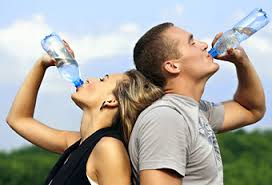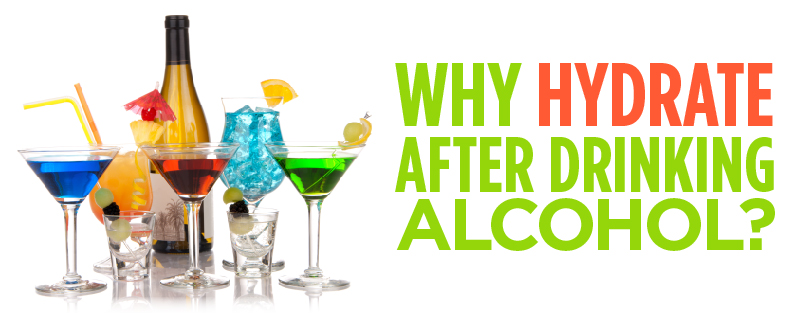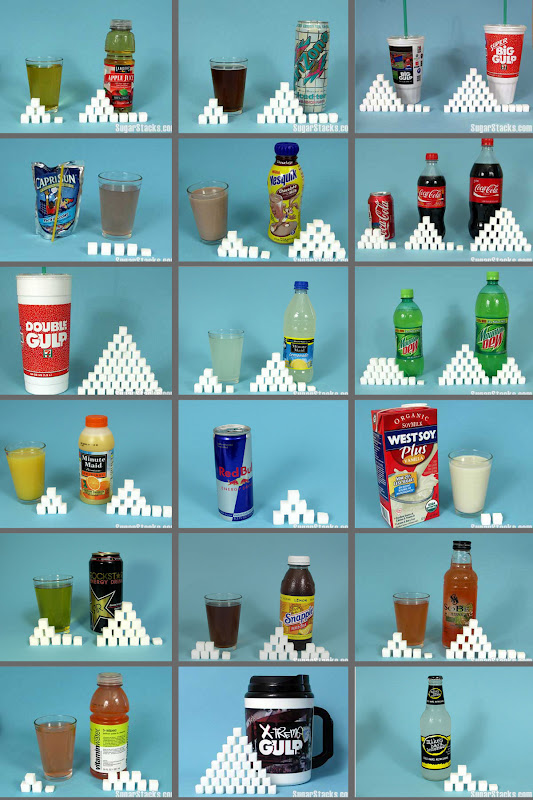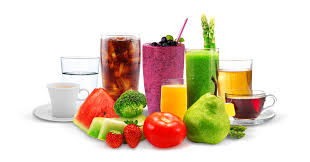
Rehydration is not always easy, depending on your level of dehydration it could take more than added a simple glass of water. Severe dehydration is commonly treated in the hospital through intravenous drips containing electrolytes and high fluid levels. Depending on the severity, one may need to stay on this feed constantly for several days. However severe dehydration is not the most common form of dehydration which is what I am writing this post about. Dehydration is not always severe, but as stated in previous posts, even just a 1% drop in body weight due to fluid loss leads to many problems. I know that it is not always easy to stay hydrated and that it is usually not the first thing on people's minds each day. So here is my advice to those who feel that may be dehydrated and want to rehydrate before it is too late. My first piece of advice? DRINK FLUIDS! While this alone will no treat all causes of dehydration it should always be the first place to start. In a previous post I mentioned the analogy of watering a plant. In terms of rehydration this can be used to explain the rate of fluid intake when trying to rehydrate. For example, when a plant is neglected for a few days and is not getting adequate fluids, like humans, it becomes dehydrated. Many times, to get the plant looking lively again, people tend to drown the base of the plant in tons of water, but do not understand that the plan is unable to absorb it all. The same concept goes for humans, drinking a gallon of water in one sitting will not hydrate the body, because on average the body can only absorb one quart every hour. This should be taken into consideration when rehydration is the goal. The next step in rehydrating should be consuming foods with high water content. Good hydrating foods include fruits, vegetable and soups. Adding these foods along with additional fluids will keep fluid intake consistent throughout the day. If dehydration is paired with an electrolyte imbalance due to exercise or diarrhea/vomiting then it is important to incorporate foods and beverages with electrolytes such as sports drinks. When rehydrating solely after an exercise refer to my post entitled "Hydration and Exercise" for more specific information on proper rehydration. Another important component in rehydration is avoiding alcohol. Alcohol increases urine production making it difficult for the body to retain the fluids it needs to properly rehydrate. If dehydration is from alcohol consumption you will need to incorporate electrolytes because of the mass amounts of sodium that were lost via urine. Dehydration due to alcohol consumption ranges anywhere from acute to severe and should be treated immediately. For tips on how to avoid dehydration when consuming alcohol refer to my post "Hydration and Alcohol/Hangovers". Dealing with hydration can be tricky, however the most important part is to determine the level of dehydration. If incurable thirst, rapid breathing, rapid heart rate, fever, amber colored urine, delirium or coma are found, call for medical assistance immediately. These are signs of severe dehydration and require medical attention and treatment.
Many people understand that when a person sweats those fluids need to be replaced for the body to function properly. However fluid intake should not only happen during exercise, but it should happen before and after a workout as well.
Before a workout it is adequate to consume between 17-20 ounces of fluid around two hours in advance and then another 8 ounces 20-30 minutes before. During the workout it is optimal to consume 7-10 ounces of fluid, preferably with some carbohydrate component, every 20 minutes. After a workout it is best to weigh yourself and then consume between 16 and 24 ounces of fluids per pound lost during the workout. Weight that is lost during exercise is simply fluid loss, and it needs to replaced so the body can function properly. Following these general guidelines for fluid consumption throughout exercise will allow the body to preform optimally.
Dehydration impacts performance greatly, and increases the risk of injury especially during exercise. A mere 1% in body weight can increase cardiovascular strain and limit the body's ability to transfer heat from the working muscles to the skin. This increases the risk for a heat related injury and hinders performance. Drinking fluids with low sugar content will be easily and quickly absorbed in the body, keeping it hydrated.
Making sure that you are getting proper fluids throughout the day is extremely important, and when exercise comes into play, this further increases the need to hydrate adequately. So grab the nearest water fountain and fill up a bottle for that killer workout! Besides, you don't want to put in all that work in the gym just to feel tired and lethargic. Drink proper fluids so that your body can preform optimally and you do not end up with an injury!
Each and everyday we are bombarded with advertisements for colas, sports drinks, coffees and energy drinks. But what happened to just plain water? The push for consumption of these beverages has increased total calorie and sugar intake. Research shows that people will consume the same amount of food whether they are drinking water or a 150 cal soda, so why add on those empty calories? I am not saying you need to eliminate all beverages that are not water, however these drinks should be consumed in moderation.
Think before you drink; is this beverage benefitting my body in any way? For example when asking this question before drinking a tall glass of skim milk, your mind will be able to answer this question 'yes' because of its calcium content. Is the beverage you are about to consume high in sugar and calories? Does it contain a significant source of vitamins/minerals?
Beverages that are good hydration sources include water, herbal tea's and fruit/vegetable juices. Coffee, sodas and alcoholic beverages are not good hydration sources and should be limited. Coffee contain purines which are a toxin and require a large amount of water when being excreted so no irritation is caused. Most of the water found in coffee is used to dilute these toxins and therefore only a small amount is left over for hydration. Soft drinks often have a high caffeine base, which makes a body lose water before it has time to make its way into the intracellular environment. The high sugar content of most sodas gives the body a hard time properly metabolizing it, causing the body to surrender water from the extracellular fluid.This makes a person thirsty and a vicious circle is created.
See yourself, here is some facts about popular beverages:
Pepsi
13 teaspoons of added sugars (208 calories from added sugars)
Canada Dry Ginger Ale
11 teaspoons of added sugars (176 calories from added sugars)
Hi-C Orange Lavaburst
10 teaspoons of added sugars (160 calories from added sugars)
McDonald’s Sweet Tea
9 teaspoons of added sugars (144 calories from added sugars)
Fruit-Flavored Gatorade
6 teaspoons of added sugars (96 calories from added sugars)





 RSS Feed
RSS Feed